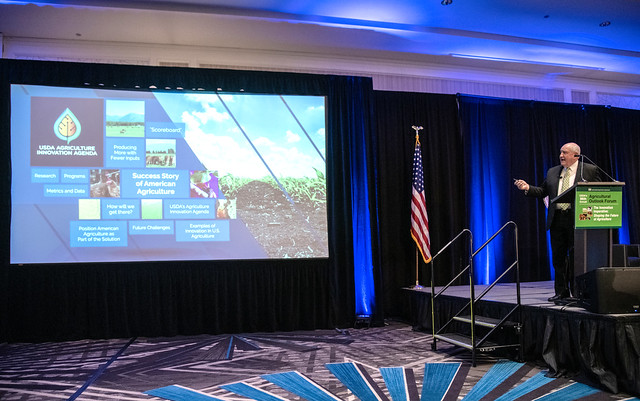
National Innovation Day was February 16th this year. The National Institute of Food and Agriculture (NIFA) directly contributes to America’s agriculture research and innovation, ultimately benefiting our farmers, ranchers, and foresters. Through an integrated approach of research, education, and Cooperative Extension (extension) – and strong collaboration with our grantees, partners, stakeholders, other Federal agencies, and Congress – NIFA ensures that groundbreaking discoveries in agriculture-related sciences and technologies reach the people who can put them into practice. Most of NIFA’s programs contribute to America’s agricultural research and innovation, including NIFA’s flagship competitive grants program, the Agriculture and Food Research Initiative (AFRI), and the Small Business Innovation Research (SBIR) grant program.
AFRI was created by the Food, Conservation, and Energy Act of 2008 (2008 Farm Bill), and subsequently funded by the House and Senate Appropriations Committees. NIFA provides AFRI grants to support research, education, and extension activities in six priority areas, originally established by the 2008 Farm Bill: 1.) Plant Health and Production and Plant Products; 2.) Animal Health and Production and Animal Products; 3.) Food Safety, Nutrition, and Health; 4.) Bioenergy, Natural resources, and Environment; 5.) Agriculture Systems and Technology; and 6.) Agriculture Economics and Rural Communities. AFRI-funded science is vital to meeting food, fiber, and fuel demands as the world’s population races to nearly 10 billion people by 2050 in the face of diminishing natural resources and increasingly variable climatic conditions.
A few AFRI-funded projects to highlight are the International Wheat Yield Partnership coordinated agricultural projects (CAP) and its predecessor Triticeae CAP (T-CAP) that focused on improving wheat and barley for climate adaptation. Like many of NIFA’s CAPs, the wheat CAPs bridge the gap across the academic research, industry, and the farming communities to produce higher yielding crops and support sustainable farming. More than 100 commercial varieties developed through the wheat CAPs have a $1.8 billion production value. This work resulted in the TCAP team, led by the University of California, Davis, which utilized markers to identify the gene variants that control the most desirable of the plant’s traits, and which subsequently created the Triticeae Toolbox that provides this information to plant breeders so they can develop improved wheat and barley lines. Learn more on this NIFA Funding Accelerates Wheat & Barley Plant Breeding infographic.
Another AFRI funded innovation project led Iowa State University researchers to develop a sensor using nanotechnology that can detect organophosphates at levels 40 times smaller than the U.S. Environmental Protection Agency (EPA) recommendations. Organophosphates are certain classes of insecticides used on crops throughout the world to control insects. NIFA supports this research through a pair of AFRI grants totaling $573,000. More on this AFRI funded project explained by this New Nanosensor Detects Microscopic Contaminants in Water blog.
The SBIR program, established by the Small Business Innovation Research Act of 1982, offers competitively awarded grants to qualified small businesses to support high quality research related to important scientific problems and opportunities in agriculture that could lead to significant public benefits. Administered by NIFA for the U.S. Department of Agriculture, the program stimulates technological innovations in the private sector and strengthens the role of federal research, development, and translation of research and development in support of small businesses. The program has awarded over 2,000 research and development projects since 1983.
Through SBIR funding, NECi Superior Enzymes (previously "The Nitrate Elimination Company, Inc.) developed kits that allow farm managers to determine nitrate accumulation levels on their farms, which helps them manage nitrate concentration, reduce costly nitrogen fertilizer use, and reduce pollutants. This product is approved by the EPA as an alternative test method for nitrate testing under the Safe Water Drinking Act and the Clean Water Act, and is used as the standard test method within all U.S. Geological Survey soil labs. NECi Superior Enzymes is a woman-owned small business located in Michigan's Upper Peninsula.
To learn more about NIFA funded impacts, or success stories, that contribute to America’s agriculture research and innovation, visit this NIFA Impacts webpage.


